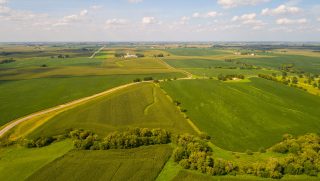A bipartisan group of senators have introduced a bill to help agriculture contribute to and benefit from comprehensive climate solutions. The Growing Climate Solutions Act directs the U.S. Department of Agriculture to create a certification program that will make it easier for farmers to develop, verify and sell environmental credits. The bill is sponsored by Sens. Mike Braun (R-IN), Debbie Stabenow (D-MI), Lindsey Graham (R-SC) and Sheldon Whitehouse (D-RI).
This legislation was met with support from the agriculture community any beyond. The bill has the support of the American Farm Bureau Federation, National Corn Growers Association, Environmental Defense Fund, McDonald’s, Microsoft, and over 40 farm groups, environmental organizations, and Fortune 500 companies.
The bill encourages sustainable farming practices by making it easier for farmers to participate in carbon markets. The Growing Climate Solutions Act creates a certification program at USDA to help solve technical entry barriers that make it difficult for farmers and forest landowners to participate in carbon credit markets.
The National Milk Producers Federation applauded the bipartisan Growing Climate Solutions Act introduced in the U.S. Senate, calling it an important step toward reducing agricultural carbon emissions that aligns well with dairy’s goal to achieve carbon neutrality or better by 2050 through the industry’s Net Zero Initiative.
Jim Mulhern, president and CEO of the National Milk Producers Federation said, “Dairy farmers are environmental stewards who value proactive approaches to sustainability, and this legislation will provide a welcome boost to their efforts. We look forward to working with Senators Braun, Stabenow, Graham, and Whitehouse to advance this bill in Congress.”
“Corn farmers have been leaders in adopting farming practices to improve the quality of soil, water, and air around our farms and are pleased to endorse the Growing Climate Solutions Act. This bipartisan effort recognizes agriculture’s role in mitigating the impact of climate change and promotes voluntary, agriculture-friendly ideas into the climate discussion,” said Kevin Ross, President of the National Corn Growers Association.
The Growing Climate Solutions Act creates a certification program at USDA to help solve technical entry barriers that prevent farmer and forest landowner participation in carbon credit markets. These issues — including access to reliable information about markets and access to qualified technical assistance providers and credit protocol verifiers — have limited both landowner participation and the adoption of practices that help reduce the costs of developing carbon credits.
To address this, the bill establishes a Greenhouse Gas Technical Assistance Provider and Third-Party Verifier Certification Program through which USDA will be able to provide transparency, legitimacy, and informal endorsement of third-party verifiers and technical service providers that help private landowners generate carbon credits through a variety of agriculture and forestry related practices. The USDA certification program will ensure that these assistance providers have agriculture and forestry expertise, which is lacking in the current marketplace. As part of the program, USDA will administer a new website, which will serve as a “one stop shop” of information and resources for producers and foresters who are interested in participating in carbon markets.
Through the program, USDA will help connect landowners to private sector actors who can assist the landowners in implementing the protocols and monetizing the climate value of their sustainable practices. Third party entities, certified under the program, will be able to claim the status of a “USDA Certified” technical assistance provider or verifier. The USDA certification lowers barriers to entry in the credit markets by reducing confusion and improving information for farmers looking to implement practices that capture carbon, reduce emissions, improve soil health, and make operations more sustainable.
Today, many third-party groups are developing protocols and testing methods to calculate emissions reduction and sequestration in agriculture and forestry. The landscape is evolving rapidly. The Growing Climate Solutions Act recognizes this fact and provides the Secretary with a robust advisory council composed of agriculture experts, scientists, producers, and others. The advisory council shall advise the Secretary and ensure that the certification program remains relevant, credible, and responsive to the needs of farmers, forest landowners, and carbon market participants alike.
Finally, the bill instructs USDA to produce a report to Congress to advise about the further development of this policy area including: barriers to market entry, challenges raised by farmers and forest landowners, market performance, and suggestions on where USDA can make a positive contribution to the further adoption of voluntary carbon sequestration practices in agriculture and forestry.


